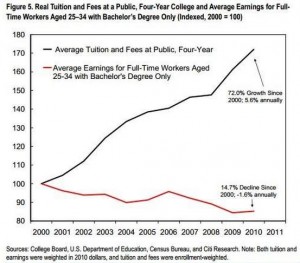 Clay Shirky has another essay on MOOCs titled, How to Save College. This essay from February 7th is in the Awl. He makes a couple of important points:
Clay Shirky has another essay on MOOCs titled, How to Save College. This essay from February 7th is in the Awl. He makes a couple of important points:
- The cost of college is going up faster than its value (see graph above that originally comes from here). Costs have been going up 5.6% (in the USA) and the earnings of people with just a Bachelors have been going down 1.6% a year. That doesn’t mean you shouldn’t get a Bacherlor’s, and I think the graph is a bit deceptive, but the rise in cost of higher education in the USA is unsustainable.
- “Things that can’t last don’t. This is why MOOCs matter.” While I am not sure MOOCs are the answer, I agree that higher-education can’t continue as is if the costs continue to go up at this rate. Various forms of competition are cropping up and more will.
- Shirky reminds us that for most people college is not the elite residential liberal arts colleges or even the large public universities. It is the commuter colleges teaching 2-year degrees (that people do part-time in many more years.) He could also have pointed out that it is becoming the millions of youth in India and China who can’t get into the coveted university positions, but still want to learn. The elite liberal arts colleges and public universities are not threatened by MOOCs – they will continue to offer an elite education to a minority who can afford the time and money it costs. It is just that cheaper alternatives to college will become how a larger and larger percentage of citizens learn.
- Shirky is particularly critical of the defensiveness of academics in the face of change. For Shirky what we do “is run institutions whose only rationale—whose only excuse for existing—is to make people smarter.” We should be open to new technologies and configurations that can do this better or reach a different audience rather than getting huffy and looking for reasons to dismiss MOOCs.
- Shirky feels academics shouldn’t be trusted “when we claim that there’s something sacred and irreplaceable about what we academics do.” We are inside the existing institutions and are invested in them. There is a danger that we will get more defensive and less willing to experiment as we feel more threatened.
- Shirky also addresses the issue of why all the fuss now when MOOCs and other alternatives have been around for a while. For him it is a matter of perception. Only now are people taking alternatives to the university seriously and that change in perception could lead to all sorts of people trying alternatives.
As I’ve mentioned before, I’m less convinced MOOCs will make such a difference, but do think that rising costs will lead to more and more people trying alternatives (of which MOOCs are only one.) The cost issues is also very different outside of the United States in countries that don’t have super expensive private colleges. In Quebec, for example, tuition is below $3,000 a year. Student protests have made it very difficult for governments to raise tuition. It is hard to imagine students choosing MOOCs that cost almost as much once you add all the course fees. Instead MOOCs will probably just be woven into public university education as a way of cutting costs so you will end up with more or less the same education.
The good news is that there is renewed interest in education which is important to education. Even better is that people still want to learn whether through MOOCs or college or reading books. Even if MOOCs turn out to be no better than reading a how-to book we should still welcome any addition to our collective knowledge and learning opportunities.